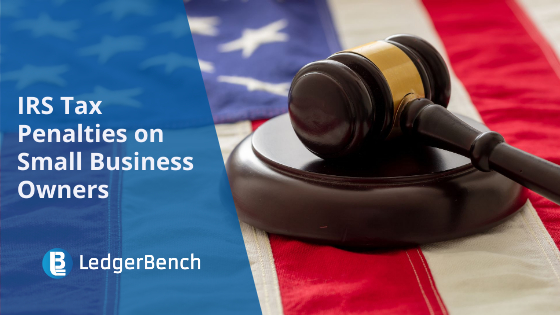
IRS, Tax
Running a small business isn’t an easy task. At each step of the business growth cycle, a new challenge arises. However, one process that remains constant all throughout the business lifecycle, is Accounting and Bookkeeping.
Both these processes are the core financial processes for any business that eventually assist in easing the Tax Reporting complexities. Tax Filing is an yearly process that every business needs to comply with in order to avoid being penalised by the IRS. However, many times small business owners prefer doing their finances on their own which can result in penalties since they lack complete knowledge of the subject.
Here we will be discussing some of the common mistakes that business owners need to look out for, especially if they don’t want to seek professional help:
Underpaying estimated taxes
Lack of proper financial knowledge can at times prove to be costly for business owners. Failure to pay at least 90% of your current year tax bill can result in the IRS penalising your business.The IRS has the right to charge a penalty even if less is paid early or more has been paid later.
Suggested Reads – IRS Tax Relaxation Deadlines for Covid-19 (With State Regulations)
Failure to file penalty/late filing penalty
This penalty can be avoided by simply paying the taxes owed on time. The IRS can charge 5% a month as penalty for late filing which can go to a maximum of 25%. Also, it is interesting to note that even if you aren’t financially stable to pay your taxes, you should at least file your taxes since the penalties for not paying taxes are far lesser.
Failure to pay penalty/late payment penalty:
Yes penalty for not paying your penalties.The IRS can do this too. The failure to pay penalty rate is .5% a month on the outstanding tax balance. However, you can enter into an installment agreement to pay back the taxes owed.
Tax Penalties for Errors or Fraudulent Returns
Mistakes are a human nature and so is fraud and embezzlement. And the IRS has all the rights to penalize your business if they find out you have either knowingly or unknowingly filled false or incomplete information. Moreover, this penalty can be as much as 75 percent on top of the total owed. Therefore, it is very important that you include all your income when filing for tax.
Suggested Reads – COVID-19 | FFCRA Emergency Family Medical Leave Payroll Tax Credit
Not depositing employment taxes
Business owners who have employed individuals must deposit their share of taxes alongwith their employee’s taxes and failure to do so can result in IRS penalties.
Not separating business and personal expenses
There is also a penalty for not separating business and personal expenses since it can make it complex for the IRS to figure out the exact legitimate business expenses. This can further cause auditing complexities.
Words of Wisdom:
Paying your due taxes correctly on time is the simplest way to avoid IRS penalties!!

Accountants, Important Dates, Tax, Tax Calender
Covid-19 has brought the economy to a halt. The global Lockdown have made it almost impossible to churn the vehicles of the economy and its revival in the future is also something that is dependent on how fast we can fight the pandemic. The IRS has come to the taxpayer’s rescue and has come out with a series of benefits, protective regulations and tax relaxations to ease everyone during these times of uncertainty.
Predominantly, all the tax deadlines that were pending for the financial year 2019 and were falling from April 1- July 15, have been extended to July 15, 2020. A list of relieving measures have since been taken to reduce stress and financial burdens during Covid-19. Additionally, individuals who still cannot adhere to the July 15th Deadline can again ask for extensions from the Department of Treasury and the IRS.
Who All Are Eligible for the New Tax Deadlines?
The new tax deadlines are applicable to all taxpayers, whether they are individuals, freelancers or filing for self-employment taxes. These umbrella relieving measures are applicable to everyone. There is no need to file for the acceptance of this relaxation of deadlines. All the taxpayers are automatically eligible for these new IRS tax relaxation deadlines.
You May Also Read – Ways to Maximize your Tax Benefits During Covid-19
Does This Relaxation Depend on All the Taxes?
Almost all the IRS tax deadlines that fell under the umbrella dates of April 1- July 15 have been an extended relaxation date till July 15. Although, it is important to note that there are differences in how the different states have responded to these IRS deadlines. Here are those below:
| Arizona, Arkansas, Connecticut |
Announced plans to end this year’s regular legislative session. |
| Arizona, Connecticut |
Announced Special Sessions to Be Held at the End of the Year. |
| California, Delaware, Kansas, Maryland |
New Revenue Forecasts Have Been Announced in These States. |
| Colorado, Minnesota |
April sales tax deadlines have been extended to May. |
| Arkansas |
The Budget for the Financial Year 2021 has been Proposed. |
| Illinois |
Legislative Administration Has Further Been Postponed. |
| Kansas |
Veto Power Has Been Postponed Indefinitely. |
| Missouri |
Spending in the Financial Year 2020 Has Been Frozen. |
| New Jersey |
Bill Has Been Enacted to Codify the Income Tax Extension. |
| Oklahoma |
The Board of Equalization has Officially Announced Revenue Shortfalls, and Will Make Use of Any Rainy Budget to Fill the Gaps. |
| Vermont |
Legislators Will Not Be Filing the Budget For Financial Year 2021 Until August or September. |
| Virginia |
Biennial Budget for Financial Year 2021, 2022 Has Been Put in Effect. |
| Washington |
Taxpayers Who Are Applying For a Tax Waiver, May Avoid the Payment of Cannabis and Alcohol Excise Taxes. |
| District of Columbia |
FY 2021 Budget to be Presented on May 12. The Rent Has Been Frozen On Commercial Tenants as Well. |
(All Information Updated As Of April 23, 2020)
How to File For Extension Beyond July 15, 2020?
If you need to file for an extended relaxation that goes beyond the July 15th extension, then you need to follow the steps below.
1. You can seek an extension by filing Form 4868.
2. Businesses who need additional time need to file the form 7004.
Wrapping Up:
The IRS and the Department of Treasury are taking multiple measures to ease citizens and businesses during these times of uncertainty. Tax Relaxation Deadlines to July 15th 2020, is one of the measures to help relax this economic slowdown. The IRS continually comes out with recent updates in the changes that are occurring and any new relief measures that are being taken. You can click here to know more.



